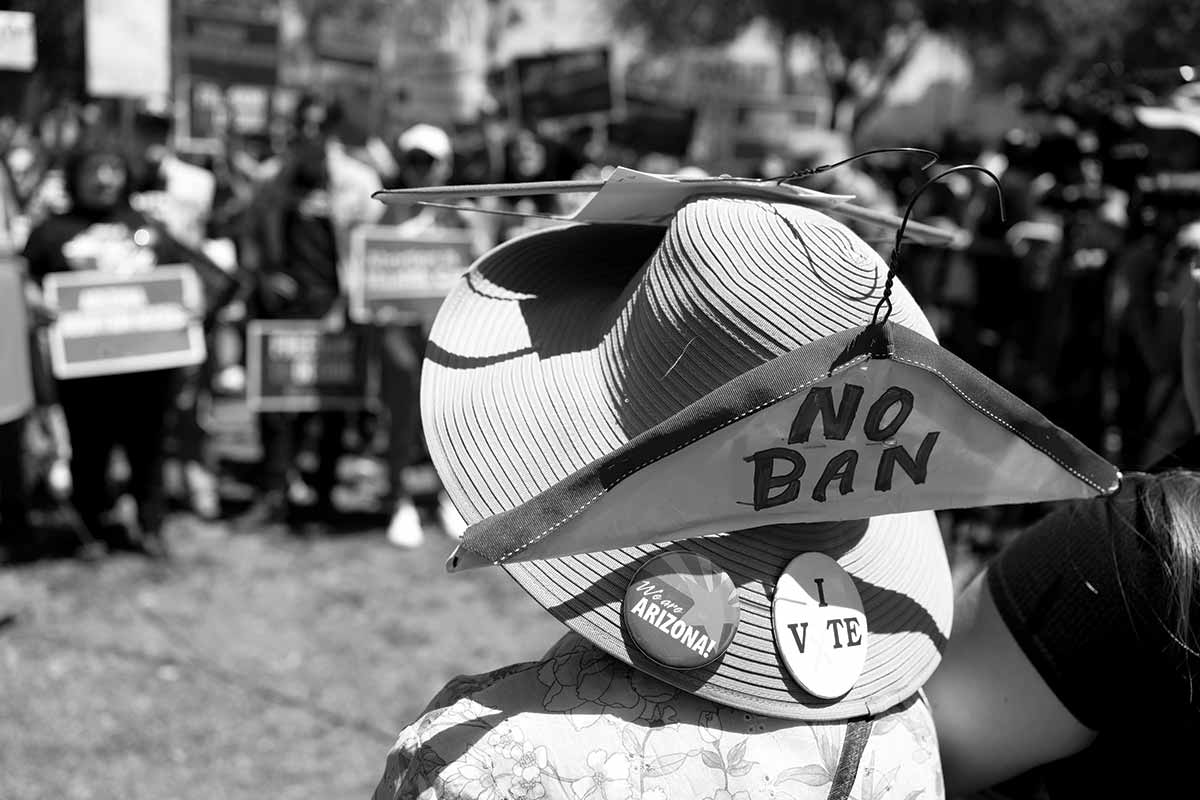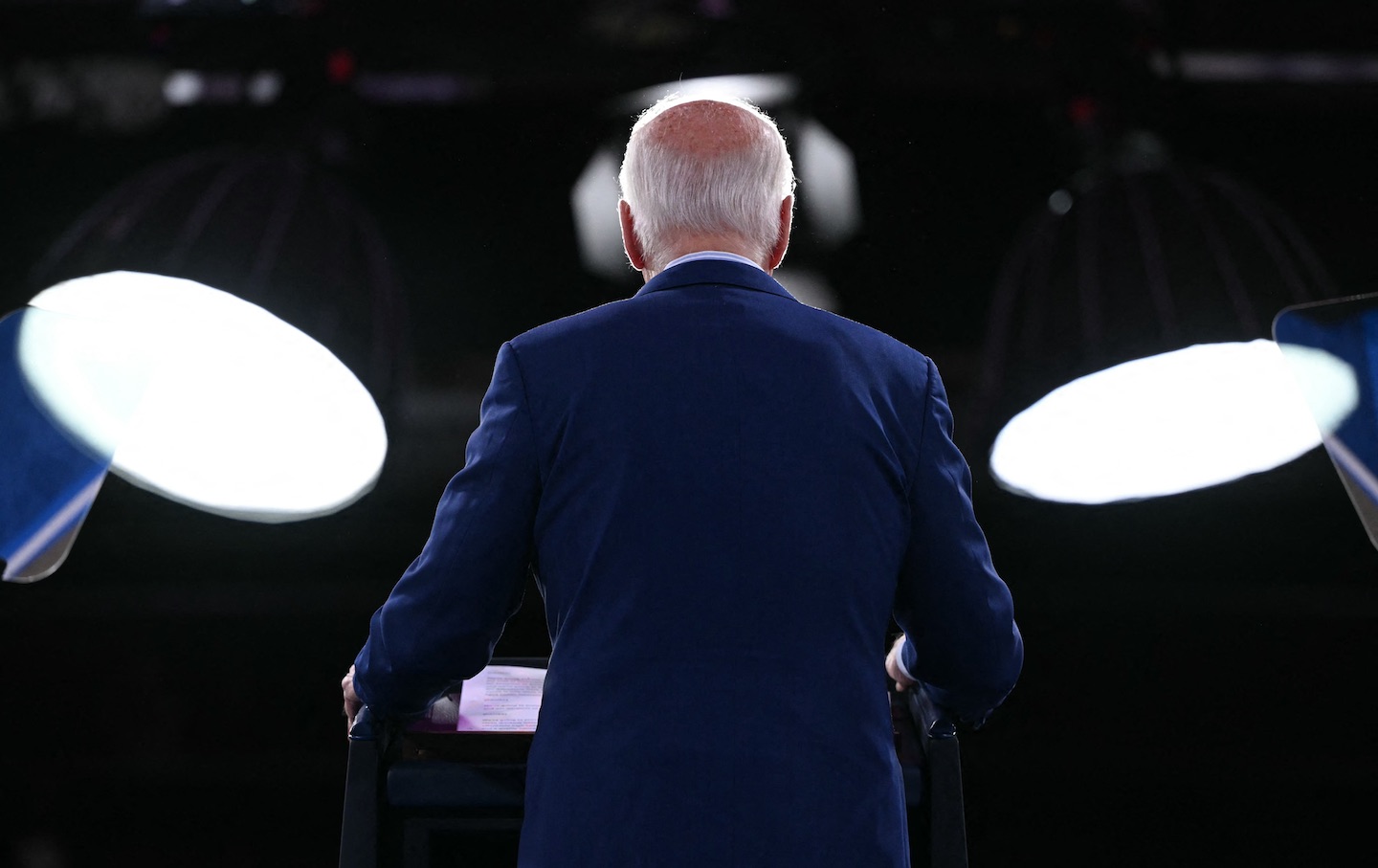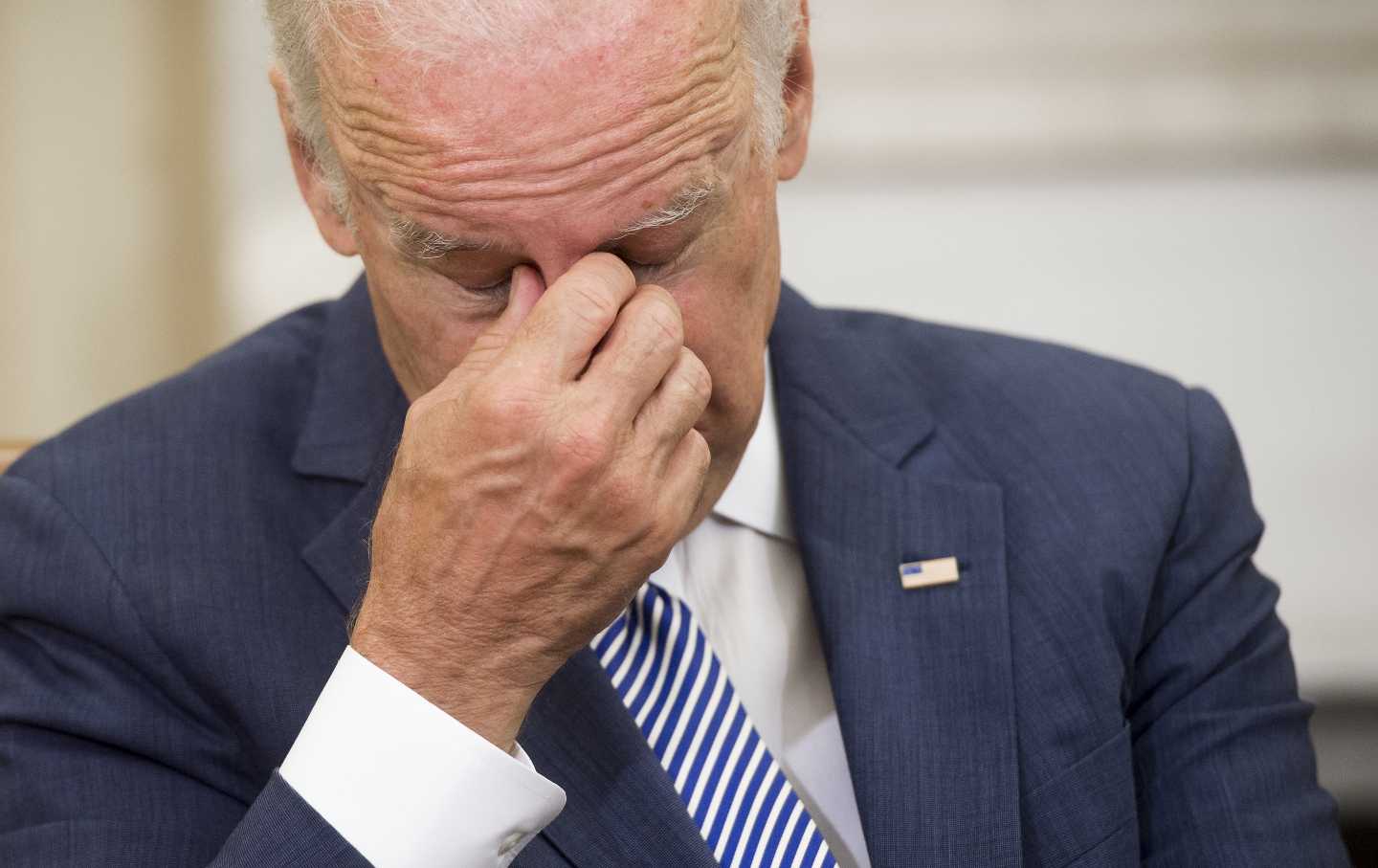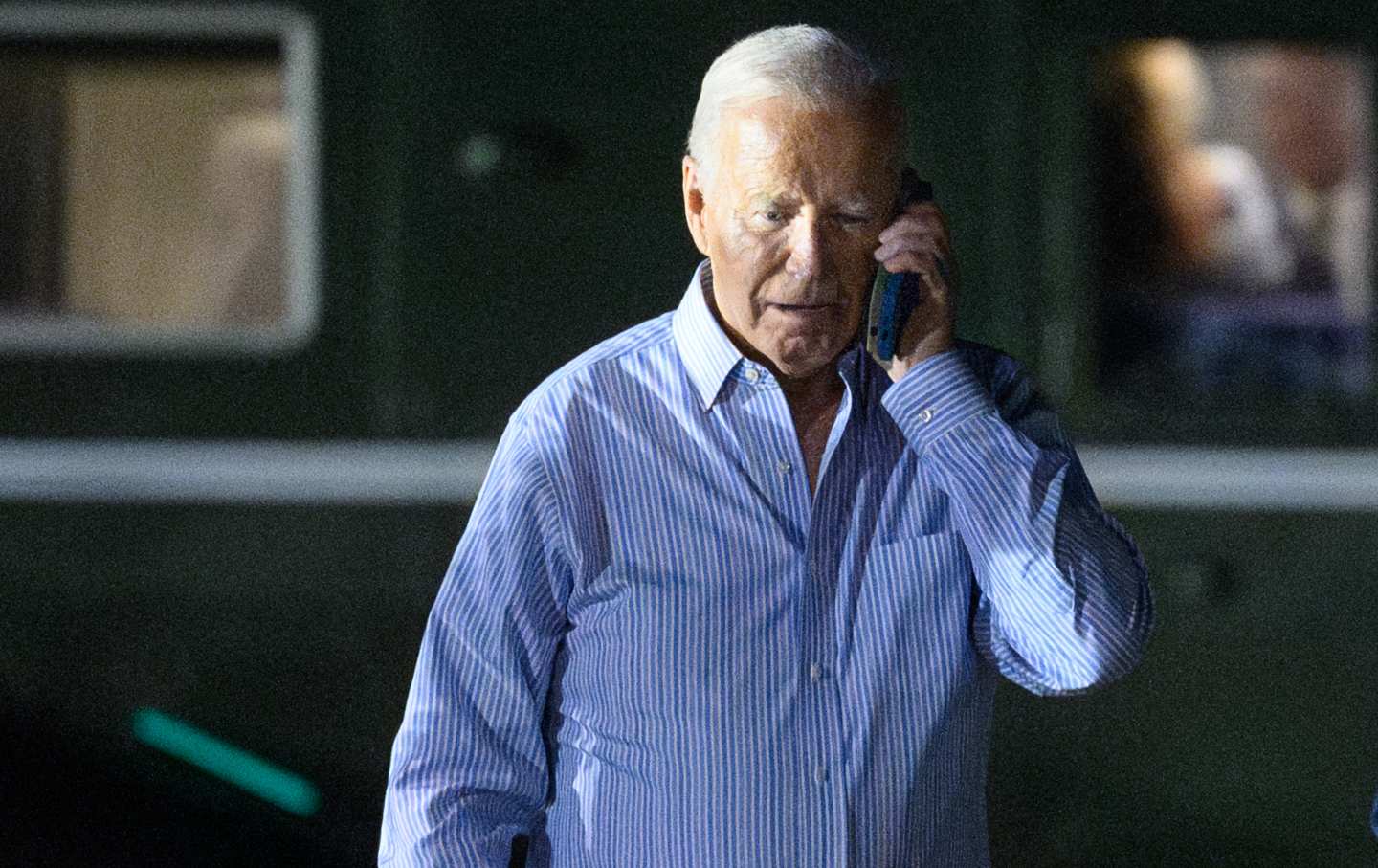
[ad_1]
In late April, Arizona State Senator Anthony Kern was hoping to make the leap from state politics to the national stage. A ruddy-faced man with a penchant for gray suits and a love of hyperbole, Kern has made a name for himself in recent years as an ultraconservative legislator, and he announced last October that he would run for the US House of Representatives. Not only had Kern been present for the events in Washington, DC, on January 6, 2021, but he was one of the 18 false electors the Trump team put forward in Arizona after losing the 2020 election. Three years later, Kern remains defiant in his interpretation of the Capitol insurrection as a peaceful expression of discontent with what he is convinced was a stolen election.
Kern’s MAGA bona fides, he thought, would serve him well in today’s Republican Party maw, giving him a toehold in the July 30 primary election for the Eighth Congressional District, a safe GOP seat in Phoenix’s leafy northwestern suburbs. Kern claims to be the only true conservative in the race, a biblical literalist—he has held prayer meetings in the Senate buildings at which participants reportedly spoke in tongues—whose political role models, he tells me, include Jesus and King David. “I like Trump,” Kern says. “I’m 100 percent behind Trump. Trump’s fighting for the country. But I’d prefer you use Jesus.”
When I meet Kern, the Arizona Senate buildings have just been evacuated after a smoke alarm went off. By the time we’re given the all-clear for reentry, Kern is riled up. “Democrats probably pulled the alarm,” he says. He may be saying it in jest; then again, maybe not. Many Democrats, Kern believes, are “sociopaths.” He accuses the party of a range of sins, including advocating for open borders and, given Trump’s claims about the 2020 election, opposing election reform. Democrats have turned universities into “indoctrination camps, training young people how to be Marxists and hate America,” Kern claims, and above all, they have embraced a death cult around abortion. “Freedom, my man, freedom,” the state senator says, summarizing his platform. “Something the Democrats don’t like.”
Arizona is shaping up to be one of the most crucial swing states in November. If the Democrats win its 11 electoral votes, Biden’s path to reelection suddenly gets much easier; it will give him a cushion for the potential loss of, say, Michigan. If Biden loses Arizona, Trump stands on the threshold of a return to power. If progressive Democratic Representative Ruben Gallego wins the US Senate seat that is being vacated by Kyrsten Sinema, the Democrats have a narrow path to retaining control of the upper chamber in an election that many pundits predict will leave them with a minority. If the GOP candidate—most likely former gubernatorial hopeful and election denier Kari Lake—wins the seat, that path all but disappears. Meanwhile, there are two toss-up congressional seats that could allow the Democrats to regain control of the House. As for the state Legislature, winning two seats in both the state House of Representatives and the Senate would give Democrats control for the first time since the 1960s—placing Arizona on a par with its neighbors Nevada and New Mexico, which have gone from being red to generally blue in recent years. In sum, just about everything is up for grabs in the Arizona desert.
A few weeks before I met with Kern, the state’s Supreme Court had allowed an 1864 territorial-era law to go into effect that bans all abortions, except when the mother is facing death, and enables courts to sentence abortion providers to prison. Pro-choice activists, who had already gathered hundreds of thousands of signatures to put a constitutional amendment on the ballot codifying the right to an abortion up until the point of fetal viability, were immediately energized. It was an issue, they knew, that had the capacity to drive voter turnout to near-record levels in November—perhaps an issue big enough to neutralize Biden’s poor poll numbers on immigration and inflation, two of the issues that are hurting him the most in the Southwest.
Even when, a few weeks later, a handful of GOP legislators joined Democrats to overturn the 1864 law, the issue refused to fade. Hard-right legislators like Kern were horrified that members of their own party had helped the Democrats repeal the law, and they took to the airwaves to make their opposition clear. Democrats believed that every time Kern and his colleagues opened their mouths on the issue, more voters—especially the all-important independents who now make up more than a third of Arizona’s registered voters—would be driven toward the Democratic candidates in November’s elections.
Meanwhile, the GOP race in the Eighth Congressional District got nastier by the minute. One of Kern’s opponents is Blake Masters, a Trump loyalist who ran for the US Senate in 2022. He spent months in the run-up to that election disparaging the integrity of the voting process and ultimately lost to the Democratic incumbent, Mark Kelly. Until Kern entered the race, Masters’s main opponent was Abraham Hamadeh, who narrowly lost his bid for state attorney general in 2022 to Democrat Kris Mayes and then refused to concede. As of May of this year, when Hamadeh filed his fourth lawsuit attempting to overturn the results, he still had not accepted the defeat—an exercise in stubbornness that may explain why Trump ultimately endorsed him.
Masters has recently taken to attacking Hamadeh for his Muslim background and for allegedly being an “anchor baby.” His campaign ads have highlighted a trip that Hamadeh took to Mecca, and he has claimed, falsely, that Hamadeh supports amnesty for undocumented immigrants. Masters also recently swiped at Hamadeh for not having a wife and kids, which, Masters said, gives him “no skin in the game.” Hamadeh has responded in kind, relentlessly attacking Masters for abandoning America First–style ultranationalism and for being an out-of-district carpetbagger—which is true, and would likely carry more weight if it weren’t also true of Hamadeh himself.
According to Kern, though, neither of these MAGA-marinated opponents is the real deal. Instead, Kern—who was recently indicted by Mayes for his role as a false elector—is pitching himself as the only true conservative in the race. Kern wears his indictment, by an attorney general he calls a “Marxist” (despite her previous incarnation as a Republican), as a badge of honor. Like Trump, he is fundraising off of his legal woes. “The voters have awakened,” Kern says, “and they see it for what it is—it’s just another sham. I did nothing wrong, nor did the other electors.”
While many Arizona Republicans, including Lake, have sought to distance themselves from the state Supreme Court’s abortion ruling, Kern has leaned into the decision. He claimed that pro-choice politicians “are willing to abort a baby at nine months as it’s coming out of the birth canal, and even 30 days after.” Kern is convinced that post-birth “abortions” are commonplace in California—which he calls “the death state”—and that they would become commonplace in Arizona, too, if the Democrats won control there. “They think by shedding innocent blood, that’s their path to victory,” he says. “Everything they touch turns to death.”
On the other side of the equation is the general public. As Republicans spout invective, volunteers throughout the state have mobilized against anti-abortion legislation. Susan Ashley, a 69-year-old retired wealth manager for Merrill Lynch, has spent up to four hours a day, six days a week, on signature-gathering efforts over the past few months, working with the organization Arizona for Abortion Access to get an initiative onto the November ballot that would enshrine the right to abortion in the state Constitution. “Since retirement, I’ve been foundering for purpose,” Ashley says. “I don’t feel there’s anything better I can do with my time right now than this job.”
Even though three Republican House members and two senators joined the Democrats to repeal the 1864 law just three weeks after the state Supreme Court decided to uphold it, abortion rights advocates remain on edge. When that repeal takes effect this fall, the 1864 ban will be replaced not with a return to the Roe v. Wade standard but with the previously existing 15-week ban, which had been enacted just before the US Supreme Court issued its Dobbs decision, and which includes no exceptions for rape or incest. And the Republicans who voted to repeal the 1864 ban—including the wife of one of the justices who decided to uphold it—are hardly in favor of returning to the Roe standard. In fact, in recent years, Arizona legislators have passed more than 30 bills that make it more difficult to get an abortion. Meanwhile, the state Supreme Court recently put enforcement of the 1864 law on hold. But until the 15-week ban kicks in to replace it at summer’s end, Arizonans—who favor repealing such extreme abortion restrictions by a roughly two-to-one majority—risk being subject to the law’s draconian restrictions should the court decide to lift the hold on enforcing it.
Ad Policy
Popular
“swipe left below to view more authors”Swipe →
On a good day, Ashley tells me, she reaps 15 signatures an hour; more often, she ends up with roughly 30 at the end of a hard four hours of tabling. (Two-thirds of them, she estimates, come from women.) It doesn’t sound like a lot. But with hundreds of signature gatherers on the case, the numbers quickly add up. By early May, with two months of signature-gathering time left, Arizona for Abortion Access organizers were confident that they already had hundreds of thousands more signatures than they needed to secure ballot access in November. They were continuing their push nonetheless, to make sure they have more than enough to withstand the challenges that always accompany efforts to put an initiative on the ballot.
The pro-choice movement is making itself felt around the state every day. On weekends, hundreds of people have attended Planned Parenthood rallies outside the Capitol, where impassioned medical providers and patients are speaking up. “To look someone in the eye, to see and know their suffering, know you can help them but know your hands are tied, is a heartbreaking experience,” Dr. Misha Pangasa, a young ob-gyn who has worked in New York, Pennsylvania, Massachusetts, Utah, and Arizona, tells the crowd one warm April morning. “I have become exhausted watching the people I care for be marginalized by politics.”
The Arizona for Abortion Access campaign operates out of a high-rise office building in downtown Phoenix (there is no sign in the lobby—the security man at the front desk says he doesn’t want to put one up for fear of attracting violent anti-choice protesters). When I visit, Chris Love, a spokesperson for the group, tells me the ballot initiative “is in alignment with Arizonans’ values. That’s true of Arizonans across the political spectrum. We don’t want politicians making personal decisions for us. Arizonans are pissed.”

“This is a disaster for Republicans,” says Paul Bentz, a pollster at the Arizona lobbying and consulting firm HighGround Public Affairs. Sitting in the downstairs conference room of a sprawling 1912 Craftsman-style house, the walls adorned with photos of John F. Kennedy and John McCain and a poster for the musical Hamilton, he starts rolling out the numbers. Trump has been polling ahead of Biden for the past several months, and before the state Supreme Court’s decision on the 1864 abortion ban, Bentz’s firm was projecting that voter turnout in November would be several percentage points lower than the near-record 79.9 percent turnout in 2020. In that model, Trump’s numbers looked better. But after the ruling, and with the Arizona for Abortion Access initiative likely to be on the ballot, the firm adjusted its calculations to factor in a surge in voting that would bring the turnout close to the 2020 level. In that scenario, Trump’s numbers start to look less formidable.
Bentz says that abortion will now “springboard” to become one of the top concerns for voters, and the presidential race in Arizona will increasingly be shaped by positions on abortion access. When Bentz polled Arizonans on criminalizing abortion providers in 2022, he found that only 22 percent supported it—while, for others, the pro-choice movement has become the catalyst for a more general political involvement. Susan Ashley, who hasn’t previously been involved in general-election campaigns, says that once the Arizona for Abortion Access signature-gathering effort wraps up, she will pivot to knocking on doors for the Democratic Party in the run-up to the election.
“It’s very difficult for me to believe Trump has mustered a multi-digit lead,” Bentz says. “I don’t see any indicator to lead me to believe Trump is ahead and definitely outside the margin of error. I don’t see a lot of organizing going on with the Republicans right now. They just had to sell their building and are not raising a lot of money.” In fact, according to Yolanda Bejarano, the chair of the state Democratic Party, the Democrats are currently raising three dollars in the state for every dollar raised by the GOP, and the Republicans had 90 percent fewer staff in the spring of 2024 than they had at the same point in the 2020 election cycle.
The organizing advantage holds beyond the issue of reproductive rights. Unite Here, the hospitality workers’ union that played a pivotal role in turning Arizona blue in 2020, is planning to bring in 500 union organizers to register voters and canvass neighborhoods six days a week, with the aim of knocking on 1 million doors before Election Day. Bentz believes that by the end of the summer, the polls will show a dead heat in Arizona. For now, Biden seems to be at an advantage.

Up until 2018, Arizona’s political climate was largely defined by its biggest political celebrity, Senator John McCain. Whether or not he lived up to the ideal, McCain styled himself as a symbol of independence and bipartisanship—a self-image shared by many Arizona voters. Six years after his death, however, the hard-right organization Turning Point USA has gained outsize influence in the state GOP apparatus, and institutionalists such as former state House speaker Rusty Bowers, who testified before the US House committee investigating the events of January 6, 2021, have been drummed out—in some instances, their homes have even been picketed by their former allies. Trump has gone out of his way to attack McCain’s legacy, and the late senator’s fans—including many who voted for Nikki Haley in the primaries—show few signs of making their peace with another Trump candidacy.
Earlier this year, Kari Lake stunned the party by releasing recordings of Arizona GOP chair Jeff DeWit trying to bribe her to stay out of the US Senate race. DeWit resigned soon after, saying Lake had threatened to release even more damaging tapes. Lake, who spent 2023 trying to persuade the courts to overturn her defeat in the gubernatorial race, has also spent much of the 20 months since the midterms engaged in a series of personal attacks against Stephen Richer, the GOP-aligned Maricopa County recorder, who has incurred the wrath of the MAGA movement by debunking claims of stolen elections since 2020. Lake has repeatedly accused him of facilitating voter fraud in the Phoenix area as part of a plot to deny her the governorship and has denounced him as a George Soros–funded traitor.
Richer regards himself as a Reagan Republican and prides himself on running a tight ship when it comes to elections. In the wake of Lake’s allegations, he has received numerous death threats from outraged MAGA loyalists, and he eventually sued Lake for defamation. “We didn’t have this for 200 years prior,” Richer says. “We had lots of people who had doubts about election administration, but in terms of widespread, significant harassment of election administrators, that’s a new phenomenon.” Perhaps realizing she didn’t have a leg to stand on, Lake recently decided not to contest the claim, and it is now up to the courts to decide how much in damages she will have to pay the county recorder.
The GOP’s woes are not, however, limited to Lake and her Trump-wannabe tantrums. As the election nears, the party’s denizens are in the midst of a very public squabble over its stance on abortion, with conservative groups such as the Center for Arizona Policy and many state legislators pushing to keep abortion bans as strict as possible, and others—especially those in swing districts, including US Representatives David Schweikert and Juan Ciscomani—desperate to neutralize the issue by calling for expunging the more extreme language from state law.
While some in the Arizona GOP are looking to find an elusive middle ground again, others are tacking hard to the autocratic right, with many state legislators vying to see who can put forward the Trumpiest policies, including book bans, prohibitions on drag shows, criminalization of homelessness, and prison time for abortion providers. One legislator wants to make it impossible for universities to bar students from bringing loaded guns onto campus. Earlier this year, Representative Rachel Jones proposed an extraordinary bill declaring that the state Legislature should pre-appoint Arizona’s 11 Electoral College members to ensure that, regardless of the outcome of the popular vote, the state would cast its Electoral College ballots for Trump.
Jones’s proposal was a bridge too far even for her often extreme colleagues (though Kern had also proposed a similar measure earlier this year), and the bill never made it out of committee. Perhaps unsurprisingly, Arizona Democrats—who have targeted eight state legislative districts in this election cycle but are putting up candidates in every one—now have high hopes that they can capture Jones’s seat. While much of her district covers the suburban and rural areas outside Tucson, enough of it is in the liberal city that there will likely be an opening to persuade large numbers of disaffected independents to vote Democratic. “We have to make people understand the urgency of the moment,” says Bejarano, the state Democratic Party chair, by “getting that message out, knocking on people’s doors, doing canvasses, keeping our coalition together.”

Arizona’s legislative districts work differently from those in most other states. Each district is represented by one state senator and two House members. In the primaries for state House races, the top two Democrats and top two Republicans—assuming each party fields more than one candidate, which isn’t always the case—proceed to the general election, and the top two vote winners in the general election win the seats. In Legislative District 17, currently represented by Jones and her equally MAGA colleague Cory McGarr, the Democrats have decided to focus on flipping one of the two seats, fielding only one candidate for the House, Kevin Volk—who is thus guaranteed a place in the general election.
Volk is 38 years old, with a thick head of red hair and abundant energy. Born and raised in the Tucson suburbs, he majored in economics at Brown University, moved to California after college for a two-year stint as an elementary school teacher in a low-income San Jose neighborhood, and completed a year as a Fulbright scholar in Mexico. He found his way into politics through an internship with Representative Gabby Giffords and, a few years later, by working for Tim Kaine’s 2012 Senate campaign in Virginia. For most of the past decade, Volk has focused on affordable housing, including setting up a company to convert used shipping containers into low-income housing units.
“I’ve been knocking on doors every week—probably knocked on about 2,000 doors at this point,” he says. While Jones and McGarr have been playing culture-war cards, Volk has found that most of the people who talk with him on their doorsteps are more concerned with abortion access, education spending, and the water supply—many Arizona communities are at risk of running dry in the coming years, a doomsday scenario that would sharply reduce property values. Where transgender students go to the bathroom, Volk says, is simply not something most voters want to talk about.
John McLean, the Democrat running for the state Senate seat in the district, agrees. McLean, who moved to Tucson in the early 1970s to study engineering at the University of Arizona campus there and ran a successful optical equipment company that built sensors for the US Navy until he retired about a decade ago, has also found that education spending and abortion are the major issues. He has met Trump voters who intend to vote for Democratic state legislators simply to protect abortion access, and he has met others who veer Republican but can’t stomach the idea of casting a ballot for the incumbent state senator, Justine Wadsack. Wadsack has voted against budget measures aimed at keeping schools open, and she also supported the 1864 abortion ban. “The abortion issue was absolutely a trigger,” McLean says, “convincing people to think about it and to take action.” Like flipping one of the House seats in the district, state Democrats believe the Senate race is one they have a fair shot at winning.
“Arizona is a state that is in flux,” says Kirsten Engel, an environmental law professor who ran for Congress in 2022. “It has been trending more blue more recently and is a microcosm on many of these national issues.” Engel was the Democratic candidate in Arizona’s Sixth Congressional District, a sprawling region in the south of the state that includes parts of central, eastern, and northern Tucson, as well as many conservative communities and rural enclaves. That year, Engel lost by a little over 1 percent of the vote. Two years later, she is running again, unopposed in the primary, and thus is virtually guaranteed a rematch against Ciscomani, the incumbent Republican. In 2022, the national Democrats neglected to invest heavily in her race; this time around, they have marked it as one of their top congressional pick-up hopes nationally and will spend large sums boosting her campaign. “We’re going to call out Ciscomani for his voting record,” Engel says. “And that will show he is an extremist, particularly on abortion.”
Paradoxically, Engel’s rhetoric has a certain overlap with Kern’s; both are building their political message around the word “freedom.” But Engel’s vision is the polar opposite of Kern’s Christian nationalism. “The message on abortion,” she argues, “is a message on freedom.” Polls show that Arizonans tend to agree with her version of liberty, and she intends to hammer home the message over the coming months of campaigning.
In precincts north and east of downtown Tucson, filled with new developments amid the cactus forests and in the shadow of the Rincon Mountains, the message seems to be resonating. Many of the residents are retirees or members of military families, and the GOP has a solid voter registration advantage in the area; but the Arizonan penchant for independence has come to the surface in this district. Democratic Party organizers increasingly believe that many nominally Republican voters will end up voting blue in at least some of the races come November.
Seventy-two-year-old Nancy Burton is a recent transplant from Albany, New York, where she served on the City Council for 12 years and as city comptroller for seven. Burton spent her days this spring leafleting and canvassing for the abortion access ballot initiative. She says she is optimistic that voters in this part of Arizona are ready to draw a line in the sand. “I have a lot of hope, especially since the Republican candidates are so extreme,” says the retiree, who moved to Tucson with her husband in 2019 after one blizzard too many on the East Coast. “I think we have every reason to be optimistic. We’ve got all the pieces in place.”

The ongoing extremist lurch of the Arizona GOP, with Anthony Kern and Kari Lake setting the pace, isn’t just fodder for conversation among Democrats in the state. It is also fueling growing alarm among what remains of the Republican old guard—the men and women who cut their teeth in an institutionalist, internationalist state party controlled by John McCain and his acolytes—at what a second Trump presidency would bring. At the same time, they suspect that an electorate impatient with the MAGA ideologues in their party will reject Trump and his movement—an outcome that may ultimately suit its moderate flank. “My long-term prediction is that MAGA loses big in ‘24,” says Tyler Montague, a moderate Republican strategist who broke with Trump and Trumpism in 2020. “And then in the party you will see more movement to have ‘normies’ come in and take office.” Assuming that inflation doesn’t head north again and that gas prices stay relatively low over the coming months, Montague sees Trump losing Arizona by a larger margin than he did in 2020—and he argues that if Ruben Gallego can tack to the middle enough to woo independent voters, then Lake, too, “is toast.” Most recent polls back this up, with some showing Lake behind by as much as 13 percent in a one-on-one against Gallego.
On the ground along the electorally vital Route 101 corridor in the Phoenix area, many moderate Republican voters agree with Montague’s prognosis—even if they’re uncomfortable with Democrats. One resident I spoke to, Tempe realtor Sandra Mitsis, has voted Republican in most presidential elections since the 1970s. She is now, however, firmly in the anti-Trump camp, alienated by her party’s stance on abortion and by the increasingly loud voices of Christian nationalists within the MAGA movement. “How dare they?” she asks angrily. “This country is made out of so many cultures, you can’t impose one religion. There’s a reason why the founding fathers said there should be a separation of church and state.” Mitsis says she’s considering voting for Biden.
Rebecca Gau, who runs the Arizona chapter of the national education nonprofit Stand for Children, is a lifelong Republican who grew up outside of DC in the Reagan era and was president of her College Republicans chapter at the University of North Carolina, Greensboro, in the 1990s. After moving to Arizona, she served as Republican Governor Jan Brewer’s director of the Office of Education Innovation. Like Mitsis, however, Gau now feels entirely alienated from the modern incarnation of the GOP, being out of step with the party on everything from its rigid anti-abortion stance to its harsh anti-immigration rhetoric and its embrace of Trump. “I don’t see how the inside of a woman’s body is anything of anybody’s business,” Gau says. “How does the government have any place in that decision? This is an issue for me to vote on. There’s no way on God’s green earth I’d ever vote for Trump or anybody like him.”
Gau, who voted for Haley in the presidential primary, believes there are many Republican women like her, who tell their families they are voting for Trump—or at least let their families assume that—but who, in the privacy of the voting booth, cast their ballot for Biden in 2020 and will do so again this year. Gau’s parents still think she voted for Trump in the last election, and until recently, she didn’t feel that it was worth disabusing them of the notion. “That’s how my parents got so flabbergasted and think the election was stolen,” she says. “It wasn’t stolen. I voted for Biden, and so did a lot of women like me.”
Thank you for reading The Nation
We hope you enjoyed the story you just read, just one of the many incisive, deeply-reported articles we publish daily. Now more than ever, we need fearless journalism that shifts the needle on important issues, uncovers malfeasance and corruption, and uplifts voices and perspectives that often go unheard in mainstream media.
Throughout this critical election year and a time of media austerity and renewed campus activism and rising labor organizing, independent journalism that gets to the heart of the matter is more critical than ever before. Donate right now and help us hold the powerful accountable, shine a light on issues that would otherwise be swept under the rug, and build a more just and equitable future.
For nearly 160 years, The Nation has stood for truth, justice, and moral clarity. As a reader-supported publication, we are not beholden to the whims of advertisers or a corporate owner. But it does take financial resources to report on stories that may take weeks or months to properly investigate, thoroughly edit and fact-check articles, and get our stories into the hands of readers.
Donate today and stand with us for a better future. Thank you for being a supporter of independent journalism.
Sasha Abramsky
Sasha Abramsky, who writes regularly for The Nation, is the author of several books, including Inside Obama’s Brain, The American Way of Poverty, The House of 20,000 Books, Jumping at Shadows, and, most recently, Little Wonder: The Fabulous Story of Lottie Dod, the World’s First Female Sports Superstar. Subscribe to The Abramsky Report, a weekly, subscription-based political column, here.
More from The Nation

Party messaging since last week’s debate has set out to convince the public that what they saw on television didn’t really happen.
Chris Lehmann

To rescue the president’s faltering campaign, Democrats need to send in their A team.
Comment
/
Jeet Heer

James Zogby, who has served on the Democratic National Committee for decades, says that if Biden stands down, the DNC can establish a transparent, fair process to choose its nomin…
John Nichols
[ad_2]